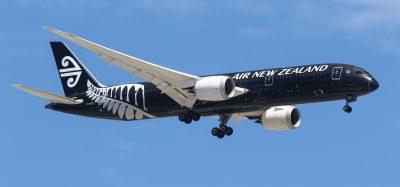Fuel for thought
- Like
- Digg
- Del
- Tumblr
- VKontakte
- Buffer
- Love This
- Odnoklassniki
- Meneame
- Blogger
- Amazon
- Yahoo Mail
- Gmail
- AOL
- Newsvine
- HackerNews
- Evernote
- MySpace
- Mail.ru
- Viadeo
- Line
- Comments
- Yummly
- SMS
- Viber
- Telegram
- Subscribe
- Skype
- Facebook Messenger
- Kakao
- LiveJournal
- Yammer
- Edgar
- Fintel
- Mix
- Instapaper
- Copy Link
Posted: 31 March 2009 | Jeff Poole, Director of Industry Charges, Fuel and Taxation, IATA | No comments yet
An interview with Jeff Poole, Director of Industry Charges, Fuel and Taxation, IATA.
An interview with Jeff Poole, Director of Industry Charges, Fuel and Taxation, IATA.
Q: How far has the IATA Fuel Quality Pool (IFQP) come since we last spoke in 2007?
The IFQP has been very successful. As you know, it’s there so that airlines can actively share fuel inspection reports and workload at locations worldwide and therefore it saves on workload by only carrying out inspections once. We currently have 70 IATA airline members from all continents and the database contains information on over 1300 airports. The whole process is very comprehensive and consistent with the latest global fuel handling standard, which is known as AS6401. We feel that the IFQP is having an impact at individual airports, which are adjusting their activities, processes and investments to meet the standards that we require. All in all it has been, and continues to be, a successful exercise for us all. It’s what might be regarded as an outbreak of common sense in the industry, to minimise costs and do things properly and do them once.
Q: With fuel prices fluctuating, what is IATA doing in terms of trying to reduce costs in the industry?
IATA is involved in pretty much every aspect of aviation in trying to reduce costs – whether that is supporting our own member airlines, or working with other providers such as airports and ANSPs, or our Simplifying the Business initiative that includes electronic ticketing, bar-coded boarding passes, Fast Travel and our Baggage Improvement Programme. On my side of the house we continue to work very hard to reduce the costs of charges, fuel fees and taxation. Last year we generated some $3.5 billion in savings.
Q: How close is the industry to creating a safe and reliable alternative fuel for commercial aviation?
We are getting closer, as evidenced by the test flights carried out by the various airlines, engine suppliers and alternative fuel companies within the past year. We’ve seen successful test flights for different types of alternative fuels. IATA is focusing on what we call third generation alternative fuels, which are bio-fuels from sources such as algae that do not have an adverse impact on water supplies, availability of land for food crops and so on. They give us the advantages that we are looking for, in particular carbon neutrality and being a ‘drop-in’ replacement for existing Jet-A1 fuel, without major changes. We have a comprehensive programme of activities on bio-fuels with a target to get the fuel certified by 2013, possibly even earlier with a 50-50 blend with Jet-A fuel. We would hope that commercial aircraft will be able to run on this type of fuel quite quickly, possibly within five years.
Q: Does your work cross-over into military grade jet fuels?
Not specifically, no. We have kept in close contact with the military on what they’ve been doing. In particular, the US military has been sponsoring work on alternative fuels, but that’s been very much a USAF funded programme, mainly with the objective of ensuring independence of supply of jet fuel in the future. Our work in the civil aviation side is very much focused on bio-fuels and at the environmental and cost impact on commercial aviation and producing the same sort of performance as existing fuels. The military objectives are a bit different. They are obviously looking for high performance jet fuels from alternative sources. It is a different business but there is a cross-over of learning here.
Q: Can you tell us about the work of the Commercial Fuel Group (CFG)?
In most of its activities IATA has formal working groups of our airline members to support and guide the work that we are doing. Commercial fuel is no exception. We have a group of airline representatives nominated to work closely with me and my team in IATA. They are instrumental in developing with us the programme for the two fuel forums that we hold each year. These forums are fundamental to the aviation fuel community. The Working Group are also involved in a lot of other activities, including standards and developing new ideas and processes that have common application across the industry. One good example is that following the fuel supply problem at Heathrow Airport after the Buncefield fire, it was recognised that many airports did not have contingency planning in place. We developed a handbook on risk management and contingency planning on fuel supply at airports. This goes out around the world to airlines trying to get their main airports to implement these ideas, and for airports to do themselves.
Q: What are the key issues due to be discussed at the next IATA fuel forum?
Well not surprisingly the next IATA Aviation Fuel Forum, in Rio de Janeiro in May, will be focusing on the economic situation and its impact on the aviation industry and aviation fuel issues. We always have a very intense debate about economics, but this time it will be centred on a number of key questions. Have we hit the bottom with the global recession? What’s going to happen to oil prices? What are the impacts on airlines? How are they going to react to that in terms of further cost reduction measures, mergers and consolidation? Where are they going to go with fuel hedging in the future? We will also continue to look at the environmental issues, the latest developments on alternative fuels and what’s happening with the emissions trading scheme in the European Union. We’ll also be looking where the future oil will come from and the production challenges with new oil fields. In addition, we are maintaining our traditional items. We will have an airline-only day which reviews what IATA is doing around the world to improve reliability of fuel supply and reduce fuel fees, and we will have a keynote address from an airline CEO etc. Together with the Working group, we have developed a standard framework within which we operate, so we have a natural flow of knowledge and progress from one Fuel Forum to the next.

















